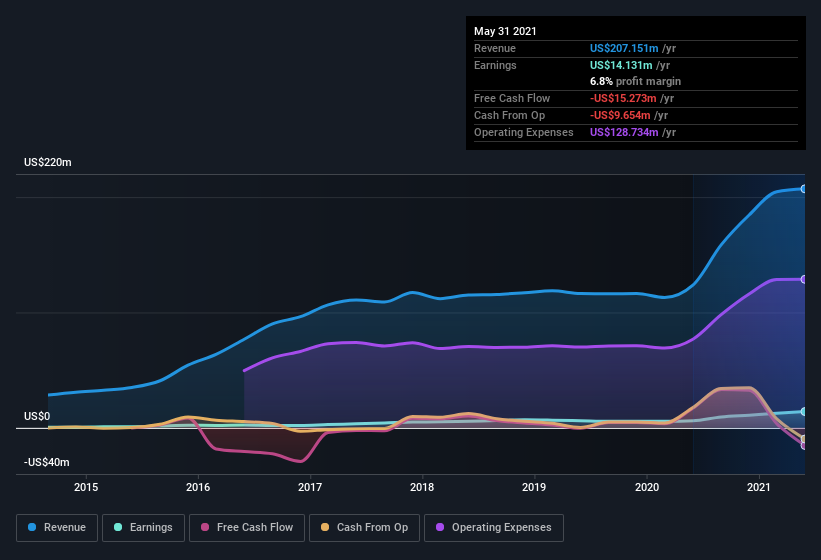With EPS Growth And More, Educational Development (NASDAQ:EDUC) Is Interesting
For beginners, it can seem like a good idea (and an exciting prospect) to buy a company that tells a good story to investors, even if it completely lacks a track record of revenue and profit. But as Warren Buffett has mused, 'If you've been playing poker for half an hour and you still don't know who the patsy is, you're the patsy.' When they buy such story stocks, investors are all too often the patsy.
If, on the other hand, you like companies that have revenue, and even earn profits, then you may well be interested in Educational Development (NASDAQ:EDUC). While profit is not necessarily a social good, it's easy to admire a business that can consistently produce it. Loss-making companies are always racing against time to reach financial sustainability, but time is often a friend of the profitable company, especially if it is growing.
Check out our latest analysis for Educational Development
How Fast Is Educational Development Growing?
If a company can keep growing earnings per share (EPS) long enough, its share price will eventually follow. Therefore, there are plenty of investors who like to buy shares in companies that are growing EPS. As a tree reaches steadily for the sky, Educational Development's EPS has grown 34% each year, compound, over three years. As a general rule, we'd say that if a company can keep up that sort of growth, shareholders will be smiling.
Careful consideration of revenue growth and earnings before interest and taxation (EBIT) margins can help inform a view on the sustainability of the recent profit growth. Educational Development shareholders can take confidence from the fact that EBIT margins are up from 6.3% to 8.6%, and revenue is growing. Ticking those two boxes is a good sign of growth, in my book.
In the chart below, you can see how the company has grown earnings, and revenue, over time. To see the actual numbers, click on the chart.
Educational Development isn't a huge company, given its market capitalization of US$91m. That makes it extra important to check on its balance sheet strength.
Are Educational Development Insiders Aligned With All Shareholders?
Like standing at the lookout, surveying the horizon at sunrise, insider buying, for some investors, sparks joy. Because oftentimes, the purchase of stock is a sign that the buyer views it as undervalued. Of course, we can never be sure what insiders are thinking, we can only judge their actions.
Despite -US$31k worth of sales, Educational Development insiders have overwhelmingly been buying the stock, spending US$233k on purchases in the last twelve months. On balance, to me, this signals their optimism. We also note that it was the Independent Director, Joshua Peters, who made the biggest single acquisition, paying US$177k for shares at about US$14.77 each.
The good news, alongside the insider buying, for Educational Development bulls is that insiders (collectively) have a meaningful investment in the stock. Indeed, they hold US$25m worth of its stock. That shows significant buy-in, and may indicate conviction in the business strategy. That amounts to 27% of the company, demonstrating a degree of high-level alignment with shareholders.
Is Educational Development Worth Keeping An Eye On?
Given my belief that share price follows earnings per share you can easily imagine how I feel about Educational Development's strong EPS growth. Not only that, but we can see that insiders both own a lot of, and are buying more, shares in the company. So it's fair to say I think this stock may well deserve a spot on your watchlist. Before you take the next step you should know about the 6 warning signs for Educational Development (2 are significant!) that we have uncovered.
The good news is that Educational Development is not the only growth stock with insider buying. Here's a list of them... with insider buying in the last three months!
Please note the insider transactions discussed in this article refer to reportable transactions in the relevant jurisdiction.
This article by Simply Wall St is general in nature. It does not constitute a recommendation to buy or sell any stock, and does not take account of your objectives, or your financial situation. We aim to bring you long-term focused analysis driven by fundamental data. Note that our analysis may not factor in the latest price-sensitive company announcements or qualitative material. Simply Wall St has no position in any stocks mentioned.
Have feedback on this article? Concerned about the content? Get in touch with us directly. Alternatively, email editorial-team (at) simplywallst.com.


